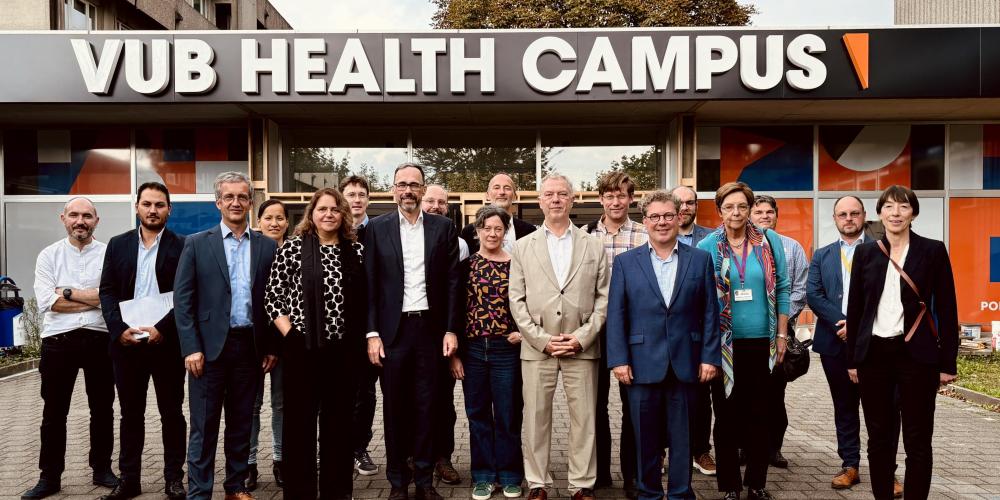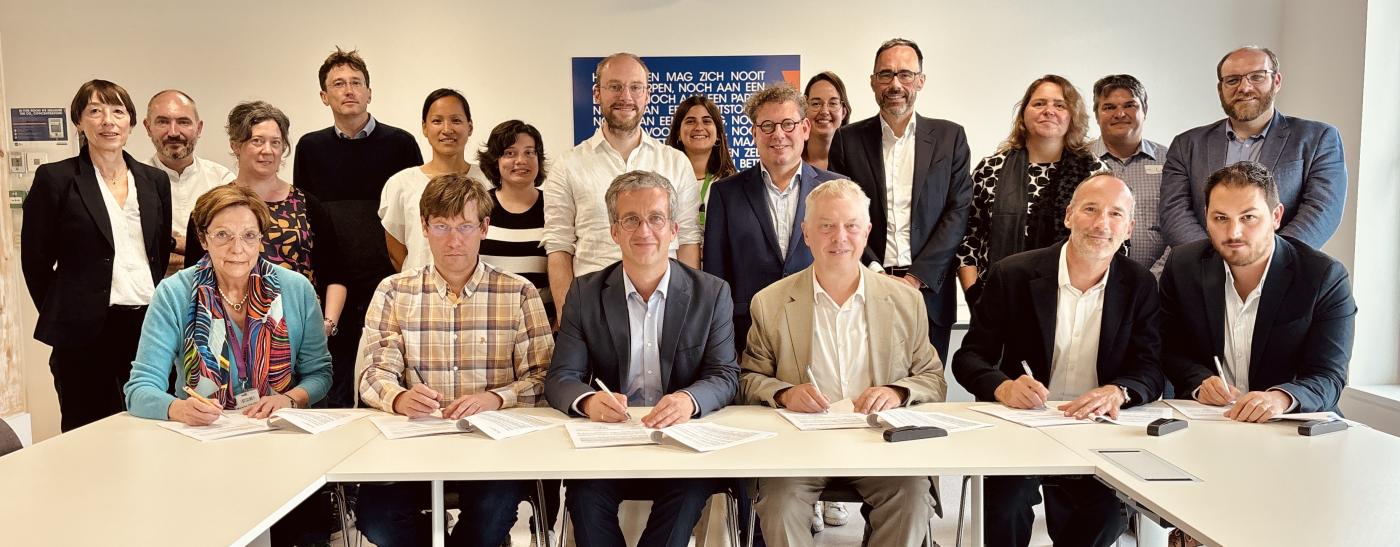
On 21 September, World Alzheimer’s Day, scientists from Vrije Universiteit Brussel (VUB), UZ Brussel, Université Libre de Bruxelles (ULB), Hôpital Erasme, Université Catholique de Louvain (UCL), and Cliniques Universitaires St Luc are developing a unique digital ecosystem for the secure exchange of patient data and expertise. This marks the first time such a multi-centre project has been established across communities, involving three universities. The three-year research and development project, called Translate-AD, aims to facilitate the safer and more efficient sharing of data to enhance understanding of Alzheimer’s disease. This could lead to earlier and more accurate diagnosis and treatment in the future. The researchers have received €2.8 million in funding from Innoviris, the Brussels agency for research and innovation.
In Belgium, an estimated 200,000 people suffer from dementia, with around 6% of them being under 65 years of age. The most common cause is Alzheimer’s disease, responsible for 70% of dementia cases in the region. Alzheimer’s is also the leading cause of death in Belgium. The disease causes the loss of brain cells and the breakdown of connections between them, leading to memory loss and cognitive decline. However, many questions about the origins of Alzheimer’s remain unanswered, partly because privacy laws have made the sharing of patient data for collaborative research challenging.
To address this need, researchers in the Translate-AD project will develop a digital platform to facilitate the exchange of expertise and patient data between university hospitals. This will enable the identification of biomarkers – the ‘fingerprints’ of diseases that predict whether someone has or will develop a condition. The project will improve diagnosis and prognosis, a milestone in treating a disease whose progression is difficult to predict. Additionally, a better understanding of the disease will likely lead to new therapeutic possibilities.
Closer, more effective collaboration for faster diagnosis
The platform will allow researchers to tackle even the most complex research questions together, without the need to exchange patient data. A research question will be translated into a script, which is then sent from a central research computer to local hospital servers. All data analyses will be conducted on these local servers, where anonymised patient data is stored. Once complete, the results of the data analysis are sent from the local servers back to the central research computer. This approach makes research collaboration far easier while fully respecting privacy regulations.
"Our three Brussels memory clinics are all recognised by the European Alzheimer Disease Consortium (EADC) as European reference centres for scientific research, diagnosis, and treatment of Alzheimer’s disease. We already enjoy collaborating on Alzheimer’s research, as the three institutions possess highly complementary expertise. Through this project, we will be able to exchange information and expertise faster and more effectively, building a shared research cohort that will be unique in its combination of research data. This will boost Alzheimer’s research in Brussels and undoubtedly lead to new insights into the disease’s origins, enabling better diagnosis and treatment for those affected or at increased risk of developing symptoms in the future," says VUB Professor Dr Sebastiaan Engelborghs, research coordinator and Head of Neurology at UZ Brussel.
“The platform is also important as more drugs are being developed to slow the progression of Alzheimer’s disease. With the digital centralisation of biomarkers, we can determine early on which patients will benefit from specific types of medication,” adds VUB researcher Dr Jorne Laton, the project’s operational coordinator.
ULB is also enthusiastic about participating in this innovative project through its neuroscience institute, UNI. "We are providing two of our advanced pieces of equipment: magnetoencephalography (MEG), the only one of its kind in Belgium, and PET-MRI. These two neuroimaging devices will give research teams access to a unique combination of molecular, functional, and structural brain imaging, enabling the characterisation of all brain changes caused by Alzheimer’s disease. Our teams will also contribute their expertise in sleep research and its disorders, an aspect that has been relatively neglected in Alzheimer’s studies," says Professor Xavier De Tiège, Director of the Translational Laboratory for Neuroanatomy and Neuroimaging at ULB’s Neuroscience Institute.
"Research remains subject to review by ethical committees and data access committees"
The research management at H.U.B. adds: "The Translate-AD research consortium in Brussels aims to create a shared database of highly characterised patients. This standardised clinical data, organised using the Observational Medical Outcomes Partnership (OMOP) model, will enable the use of artificial intelligence to identify key markers for diagnosing and predicting Alzheimer’s disease at an early stage. Hôpital Erasme will lead the standardisation phase for clinical databases at each hospital using this common data model (OMOP)," says Assoc. Prof. Dr Jonathan Cimino, Clinical Research Director at H.U.B.
"Translate-AD is an ambitious project for the Brussels region in the fight against Alzheimer’s disease. It aims to provide researchers with secure access to clinical data and to make research readily available to serve patients," says Bernard Hanseeuw, Professor of Neurosciences at UCLouvain and President of the Belgian Neurological Society.
"The Translate-AD project strengthens internal collaboration between UCLouvain researchers, clinicians, and data analysts from the medical informatics department at Cliniques Universitaires Saint-Luc. This dynamic approach also fosters interoperability, making it easier to share data with other national and international institutions. Since late 2020, the medical informatics department at Cliniques Universitaires Saint-Luc has been digitising and structuring medical data by integrating natural language processing techniques and key terminologies (SNOMED CT, LOINC, Orphanet) into the electronic medical record. This approach supports the implementation of an innovative ecosystem where data is stored locally within hospitals, and instead of the traditional method of sending data to researchers, ‘research comes to the data.’ Researchers submit their queries as statistical analysis algorithms or artificial intelligence models and receive the aggregated results. This process allows access to large amounts of medical data without transferring it, ensuring compliance with health data protection regulations (GDPR)," concludes Marianne Philippe, Deputy Chief Medical Information Officer at Cliniques Universitaires Saint-Luc.

Data protection remains a priority
The researchers emphasise that patient data will be fully protected at all times. Advanced AI techniques will be used to secure the data, ensuring that only authorised researchers can access it. In addition, regular meetings will be held for patients participating in the research, where scientists will share results and updates on the study, keeping patients informed about how their data is being used.
One of the largest research projects supported by Innoviris
Translate-AD is funded by the Brussels-Capital Region through Innoviris, with a grant of €2.8 million. "The project aligns perfectly with the Regional Innovation Plan, where healthcare is a key strategic area. Healthcare research is one of Brussels’ strengths, and this project has the potential to revolutionise the diagnosis, treatment, and care of vulnerable Alzheimer’s patients. We are particularly pleased that this project is a collaboration between the three largest universities and university hospitals in Brussels, further strengthening the local healthcare ecosystem," says Stefaan Sonck Thiebaut, Director General at Innoviris.
Ambitious plans beyond borders
Although the platform is initially focused on Alzheimer’s patients in Brussels, the researchers have long-term plans to expand it to other Belgian and international centres. This would create a platform applicable to research on other (rare) diseases and foster cross-border collaborations.*
*This is a machine translation. We apologise for any inaccuracies.